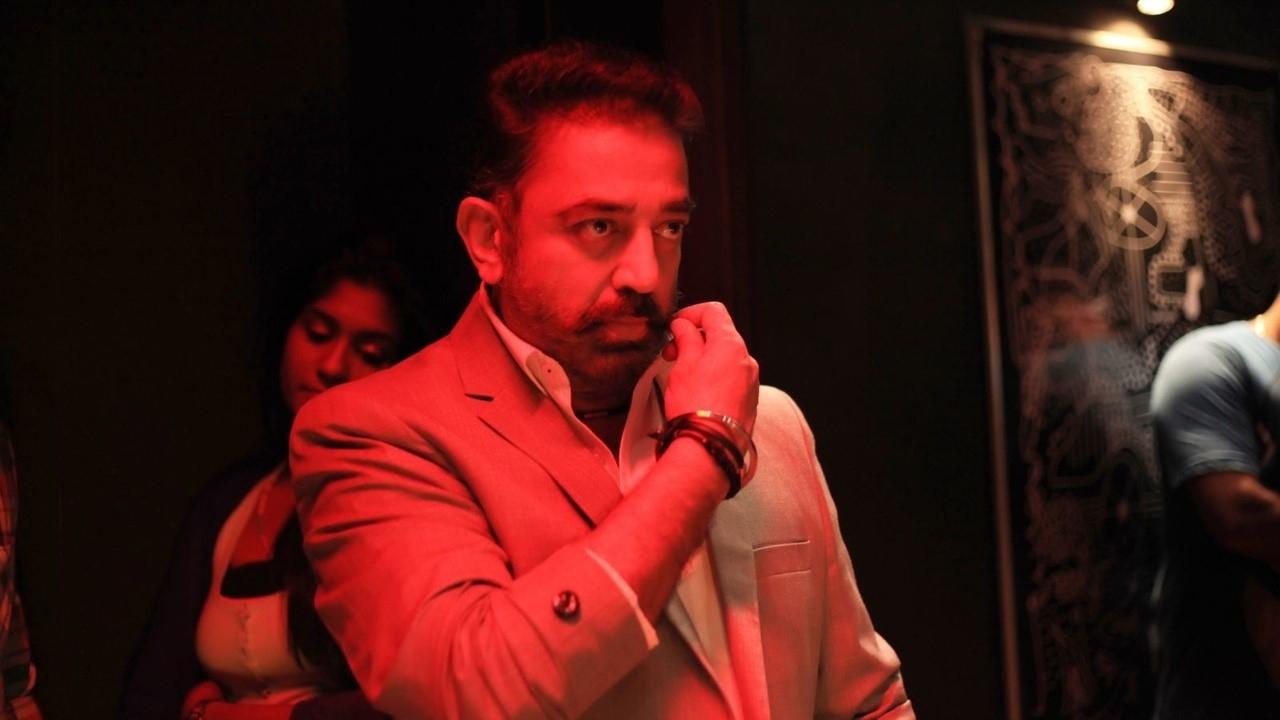Kamal Haasan has had three releases this year, and in a way, all three films have been about a man looking out for his family. In Uttama Villain, he played a dying movie star who wants to make amends with the children he has ignored all his life. The cable TV operator of Papanasam was someone who used his intelligence to cover up a murder that could have torn apart his family. Now, in Thoongaavanam, Kamal is CK Diwakar, a cop who fights tooth and nail with both gangsters and cops to save his kidnapped son.
There are also a few more similarities with the other two films. As in Uttama Villain, we get a scene where a son, who has come to resent his father for ignoring him, realizes that his old man actually cares a lot for him. And just as we saw in Papanasam, here, too, the hero, CB Diwakar is involved in a game of cat and mouse with the cops while trying to cover up a crime. He is a cop with the Narcotics Crime Bureau, and has staged an unofficial drug bust with his colleague Mani (Yugi Sethu). Vittal Rao (Prakash Raj), a club owner to whom the drug belongs, kidnaps Diwakar's son (Aman Abdullah) and orders him to return the stolen drugs in exchange for his son. Vittal himself is in trouble with Pedha Babu (Sampath), the gangster to whom he owes the drugs. Diwakar goes to Vittal Rao's club but is spotted by Mallika (Trisha), a fellow cop, who alerts her boss Dhiraviyam (Kishore) to this fishy business. Meanwhile, the bag containing the drugs goes missing and Diwakar has to use both brain and brawn to rescue his son and get out of the place alive.
Thoongaavanam is a remake of Frederic Jardin's French film Sleepless Night, and Kamal Haasan's script largely stays close to the original. But unlike Papanasam, where the thrills of the original remained in tact in the remake as well, here, those who have seen Sleepless Night will experience ennui while the rest might notice how the film fails to generate tension consistently. You can't put a finger to it, but something has definitely gotten lost in this translation. One reason for this could be that Rajesh M Selva doesn't capture the frenetic pace of the original, which hurtled from one scene to the next without pausing for breath. Here, after a point, we get the feeling that the film is repeating itself with similar set-ups — Diwakar trying to evade Vittal Rao and Pedha Babu, and Diwakar trying to shake off Mallika and Dhiraviyam amidst the partying crowd, terrified cooks and clientele. The night club (named Insomnia, a subtle nod to Sleepless Night) is the dominant setting and even though the film cleverly spreads the action across various areas in the club — bathrooms, party floor, kitchen, VIP lounge and the parking area — it isn't enough to shake off the feeling of claustrophobia. By the time the film gets over, we feel exhausted.
The additions to the plot (the original clocked a lean 90 minutes while this one goes on for over two hours) are clearly unwarranted. Like the bit about a star film that has failed to release on the promised date because of the producer's financial woes — a dig at the actor's own Uttama Villain, or the epilogue, which is mainly a sop to fans.
But even though the film doesn't come together as effectively as it should have, there are moments that keep us glued. A couple of bone-crunching fistfights (testing the limits of the UA rating) in the club's kitchen are clearly the stand-out scenes, and the stunts, supervised by the original's stunt choreographer, Gilles Conseil, raise the bar in action choreography. The tetchiness in the relationship between Kamal and his son in the initial scenes are nicely realized. Technically, the film is solid, as are the performances. Kamal's performance, here — stylish and a lot more heroic — is markedly different from what we had seen in his other two films this year. And he superbly balances the steeliness of the cop with the tenderness of the father. The understated Kishore and Sampath are quite a contrast to the flamboyant Prakash Raj, who steals the show. The latter plays a role that has become his stereotype — the over-the-top villain, but beneath the flashiness and the comic tones, he brings out the vulnerability of the character. Trisha is the lightweight among these performers, but surprisingly, the actress feels just right for the role. To an extent, these factors keep the film engaging, but when it's Kamal Haasan, is merely engaging enough?
